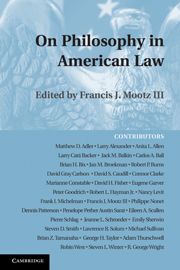Book contents
- Frontmatter
- Contents
- Introduction
- PART I KARL LLEWELLYN AND THE COURSE OF PHILOSOPHY IN AMERICAN LAW
- PART II PHILOSOPHICAL PERSPECTIVES ON LAW
- PART III AREAS OF PHILOSOPHY AND THEIR RELATIONSHIP TO LAW
- PART IV PHILOSOPHICAL EXAMINATIONS OF LEGAL ISSUES
- PART V LAW, RHETORIC, AND PRACTICE THEORY
- PART VI QUESTIONING THE RELATIONSHIP BETWEEN PHILOSOPHY AND AMERICAN LAW
- 28 Law and Philosophy at Odds
- 29 Jurisprudence: Beyond Extinction?
- 30 Law and Philosophy in the Hyperreal
- 31 Philosophy? In American Law?
- PART VII COMMENTARIES
- Contributors and Selected Bibliography
- Name Index
- References
29 - Jurisprudence: Beyond Extinction?
Published online by Cambridge University Press: 31 July 2009
- Frontmatter
- Contents
- Introduction
- PART I KARL LLEWELLYN AND THE COURSE OF PHILOSOPHY IN AMERICAN LAW
- PART II PHILOSOPHICAL PERSPECTIVES ON LAW
- PART III AREAS OF PHILOSOPHY AND THEIR RELATIONSHIP TO LAW
- PART IV PHILOSOPHICAL EXAMINATIONS OF LEGAL ISSUES
- PART V LAW, RHETORIC, AND PRACTICE THEORY
- PART VI QUESTIONING THE RELATIONSHIP BETWEEN PHILOSOPHY AND AMERICAN LAW
- 28 Law and Philosophy at Odds
- 29 Jurisprudence: Beyond Extinction?
- 30 Law and Philosophy in the Hyperreal
- 31 Philosophy? In American Law?
- PART VII COMMENTARIES
- Contributors and Selected Bibliography
- Name Index
- References
Summary
Looking out on the legal world today, we can hardly fail to notice that law – that vast, sprawling enterprise constituted by lawyers, judges, bailiffs, specialized and sometimes arcane procedures, daunting technical jargon, and dusty old books – persists and even flourishes. Meanwhile, jurisprudence in its core or classical sense seems close to moribund. To be sure, the term jurisprudence has no set or canonical meaning, so the term can be used to include intellectual inquiries that currently thrive. But in its core sense, jurisprudence is understood to name the enterprise of theorizing or philosophizing about the nature of law – about what law is – and that enterprise currently exhibits few signs of life.
Of the various subjects of legal study, jurisprudence is the one in which the most momentous and profound questions about law are presented and in which, as Holmes (1887: 478) put it, we might hope to “connect … with the universe and catch an echo of the infinite.” Or so we might suppose – but it seems we would be wrong. In recent years, at least, the questions addressed under the headings of “jurisprudence” or “philosophy of law” hold little interest for any but the purest (i.e., the most incorrigibly academic) of theorists. It is hard to resist the impression that the questions are merely semantic, and that some of the most powerful minds in the profession are amusing themselves with word play.
- Type
- Chapter
- Information
- On Philosophy in American Law , pp. 249 - 256Publisher: Cambridge University PressPrint publication year: 2009
References
- 1
- Cited by

